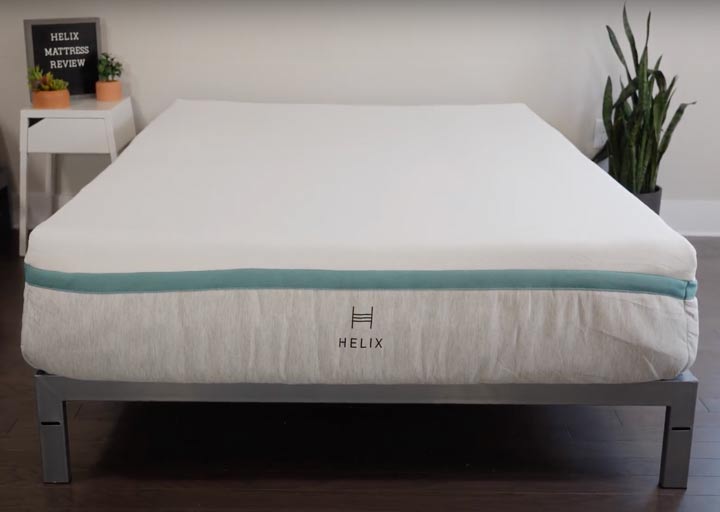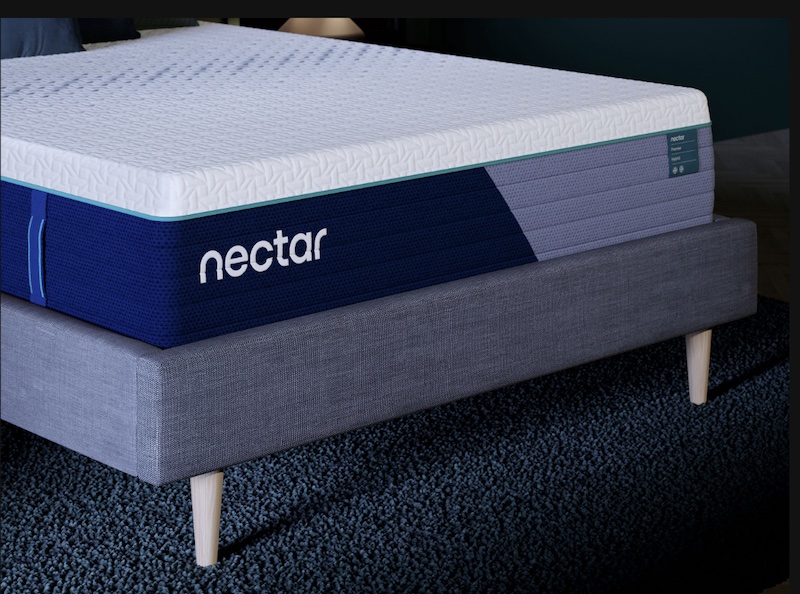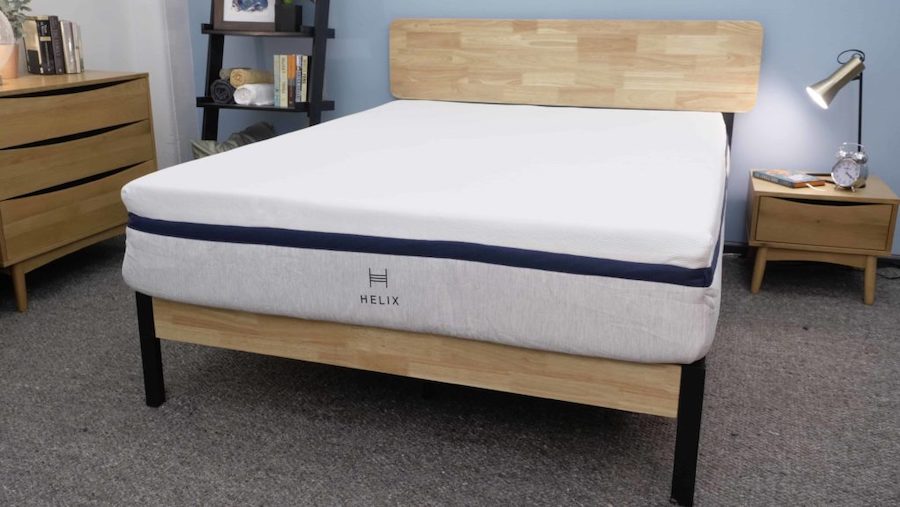There are different factors to account for when you decide to shop for a mattress. Given the fact that this is one of the most important purchases for your bedroom, understanding key mattress features will help you pick a great bed that can work well for your needs.
Mattress firmness is one of those key characteristics to consider before you make a purchase. Finding the right level is critical for a good night’s sleep. If you select a unit that is too soft or too firm, you are unlikely to sleep well and could start experiencing back issues.
Luckily, many top mattress companies offer different levels of firmness so there’s something for everyone. This guide will provide you with important details on the significance of this topic and which sleepers fit within different firmness categories.
What is Mattress Firmness?
Mattress firmness reflects how soft or firm the bed feels when you lie on top of it. While manufacturers will design their beds with a specific firmness, it’s important to note that this is subjective. Two sleepers can experience the same mattress differently. For instance, a lightweight individual may feel a certain bed is firmer, while a heavier person may experience a softer sensation.
In some cases, people may assume firmness ratings and support are the same. While they can impact one another, there is a difference. Support is a measurement of how well the mattress is able to keep your spine in a healthy, neutral alignment. Often, a firmer mattress can help with support, but this may not always be the case.
Also, keep in mind that mattress size shouldn’t impact your overall firmness feel. The biggest influence of firmness is typically the sleeper’s body weight and sleep position.
Why Does Mattress Firmness Matter?
Mattress firmness is a key feature because it will determine the overall level of comfort and can impact how supportive the bed is. Firmness can also influence how successful the mattress is at relieving pressure. A firmer bed may not provide enough contouring to relieve sensitive pressure points for certain sleepers, which could result in difficulty sleeping and achy joints in the morning.
What Does One Firmness Fits All Mean?
“One firmness fits all” is a phrase used to describe the type of firmness that is going to suit the majority of sleepers. The truth is that most sleepers would prefer a bed that ranges between 5 and 7 on the firmness scale, which gives a medium or medium-firm feel.
With this in mind, it would be appropriate to assume that 6 out of 10 is the metric that the majority of people should consider. That being said, there are examples in which certain sleepers will want something more plush or firm, and this is dependent upon their body type and sleep posture.
However, we strongly suggest that you check the bed first and make sure that it is integral and reliable. Firmness is undoubtedly a critical characteristic, but there are other important considerations that you’d have to consider too.
There are different types of beds available to consumers, some more helpful than others. Mattresses built with lower-quality materials, for instance, might be firm and yet fail to deliver the necessary support. The upside is that most top online brands provide generous trial periods, a good indicator of a quality product. These trial periods allow you sufficient time to test out the bed at home to ensure it’s a comfortable, supportive fit.
Find the most comfortable mattresses here.
Firmness vs. Support
As mentioned, firmness and support are two separate concepts. Firmness measures the immediate feeling that you get as you first lie down on your mattress. Support, on the other hand, refers to whether the bed keeps your spine in perfect alignment.
In many cases, a firmer feel may correlate with a supportive bed, but there are no guarantees. Softer beds can be supportive to the right sleeper, which is why remembering the subjectiveness of firmness is important during the shopping process.
When selecting a new bed, you will need to consider both these categories. Furthermore, firmness can influence pressure relief so if that’s important to you, be sure your bed is comfortable enough to alleviate pressure. For instance, a firm mattress might fail to deliver the necessary contouring and, as a result, it wouldn’t be appropriate for people who prefer to sleep on their sides.
Our Mattres Firmness Scale & Chart
Extra Soft (1-3.5)
Extra-soft mattresses are extremely plush. Unfortunately, they are usually incapable of delivering proper support. They create significant sinkage, which is often a red flag that a bed won’t be supportive enough, which would be detrimental to your spinal health. We haven’t reviewed any beds that have this level of firmness.
Soft (4-4.5)
These are plush or soft mattresses that usually have a sinkage that ranges from 1.5 to 3 inches. These would usually come in two different forms – a deep cushion hug and a traditional deep contour memory foam. These are great for people who prefer to sleep on their sides and are under 130 pounds.
Find some of our favorite soft mattresses below:
Product
Type
Score
Medium-Firm (5-6.5)
Medium or medium-firm beds are the preferred options on the market, accommodating the biggest number of sleepers. Most beds we have reviewed have been around this level. You can either go for the average 6 or use something slightly softer around a 5, depending on your personal preferences. Beds with a medium firmness can usually accommodate different sleep positions, which is also why they’re often recommended for combination sleepers.
Explore our picks for high-quality medium-firm mattresses:
Product
Type
Score
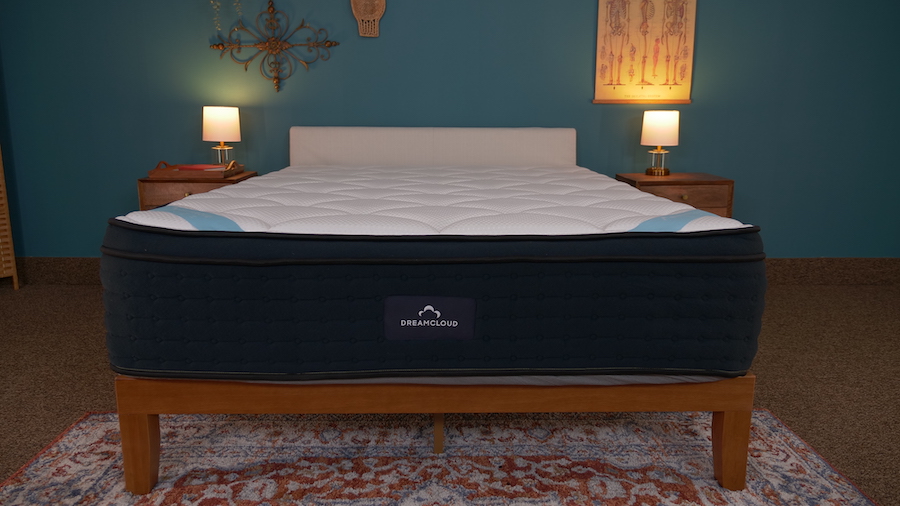
Product
Type
Score
Firm (7-8)
These are slightly firmer to firm mattresses, and they provide a little less hug and sinkage than the medium ones. There are certain exceptions, depending on your body type, but these generally accommodate people who prefer a little more firmness underneath them. Certain back sleepers and those who regularly lie on their stomachs should enjoy these beds.
Browse our picks for high-quality firm mattresses:
Product
Type
Score
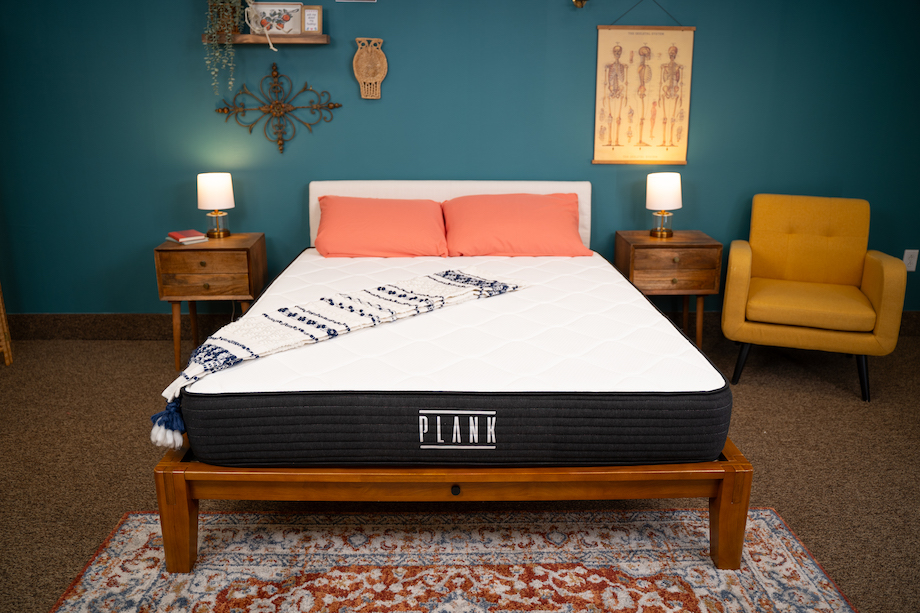
Product
Type
Score
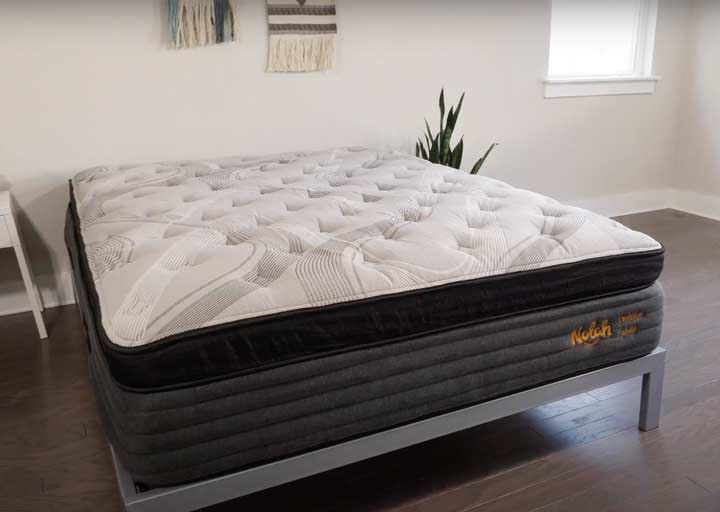
Product
Type
Score
Extra-Firm (8.5-10)
These mattresses are the hardest types available. There are very few beds within this range, though some companies have a niche inventory catering to extra-firm beds. Because only a limited amount of people would actually prefer this type of unit, they usually aren’t as popular in the bedding market.
Best Mattress Firmness Depends on Weight and Sleeping Position
Check Out Our Guide: Firm vs. Soft Mattress
| Firmness Level | Weight | Sleeping Position |
| Soft | Light, Average | Side |
| Medium | Light, Average, Heavy | Side, Stomach, Back |
| Firm | Heavy | Back, Stomach |
What Comfort Level of a Mattress is Right For You?
Sleeping Position
Stomach Sleeper
Stomach sleepers usually enjoy a firmness around a 7 or 8, though some lighter weight sleepers might like a 6 rating. The reason for this is that they typically prefer minimal sinkage to help make sure their midsection doesn’t dip too much, as this could cause the spine to curve at an awkward angle.
Need more info? Check out our guide to best mattress for stomach sleepers.
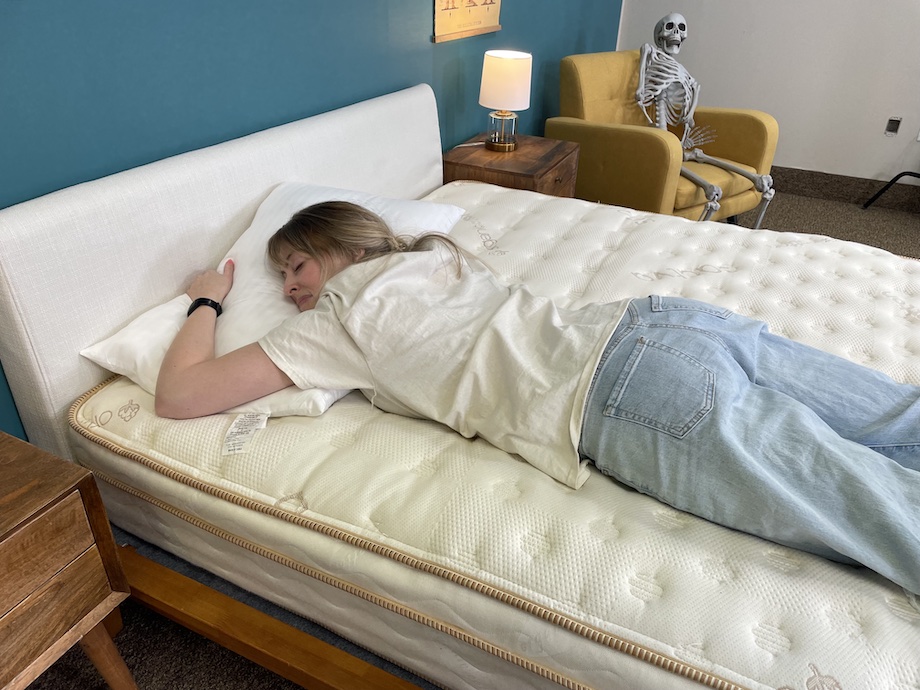
Side Sleeper
Side sleepers typically require softer mattresses. Most people who sleep on their side should experience quality pressure relief without losing vital support in the mattress range of 4 to 6. Pressure relief is important to side sleepers because this position causes body weight to become concentrated at a smaller surface.
Find Out More: Best Beds for Side Sleepers
Back Sleeper
Back sleepers are typically best suited with medium-firm beds between 5-7 on our firmness scale. These mattresses often provide enough firmness while still giving the sleeper good pressure relief. However, some users may enjoy slightly firmer beds, depending on their preference.
View Our Guide: Best Mattresses For Back Sleepers
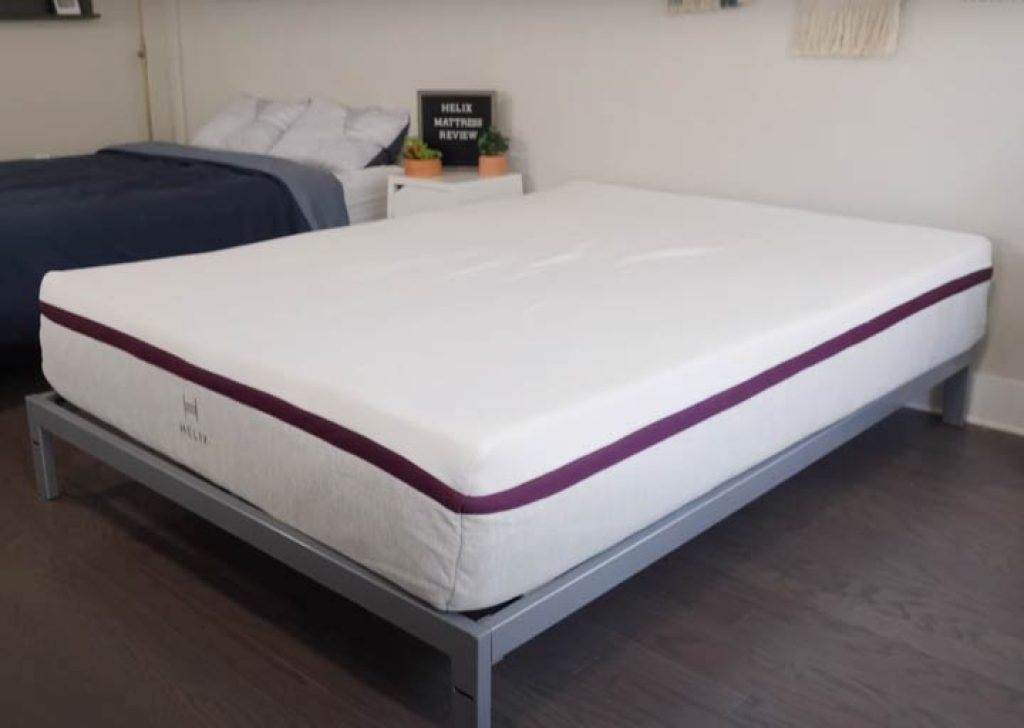
Sex
Male
Men are usually heavier than women, so they may be drawn to firmer mattresses. The general rule of thumb is that when you are a bit heavier, you should use something firmer in order to prevent spinal misalignment. As mentioned, firmness and support can influence one another, and oftentimes, firmer beds help keep the sleeper elevated for better alignment.
Female
Many women should find the medium-firm feel most comfortable, as it can keep them well-supported while still relieving pressure in sensitive areas like the hips and shoulders. That being said, this can vary as well, with some women preferring softer beds while others may enjoy firmer selections.
Weight
Heavy
Heavy people usually do well with medium-firm to firm mattresses, though, their sleep posture will also influence this. Heavier sleepers place more pressure on the mattress, and that’s why the natural reaction for it is to sink too low.
A firmer feel will allow them to activate pressure-relieving layers without bottoming out. The thickness is also important. Make sure that you go for one that is at least 10 inches thick.
Want to read more? Read our complete guide to best mattresses for heavy people.
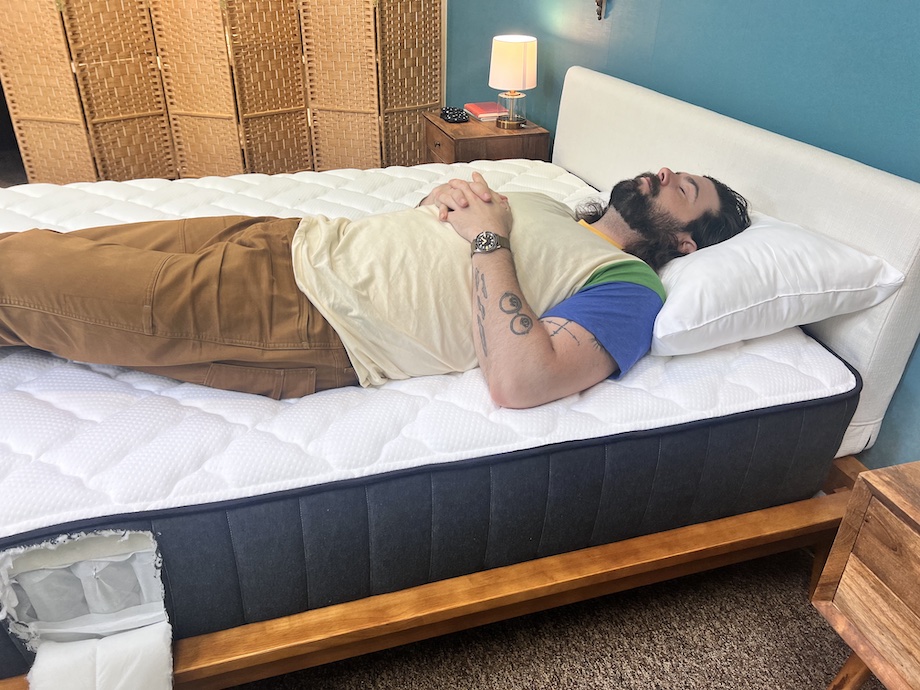
Light
Lightweight people are an ideal match for on soft to medium-firm mattresses, depending on their sleep position. This is because they won’t be putting a lot of pressure on it and, as such, the sinkage is not going to be substantial. A lightweight sleeper on a firm mattress can create more unnecessary pressure points. The goal is to have your mattress contour your body enough to melt away pressure.
Explore beds for petite sleepers.
Pain
Back Pain
Mattresses fit for handling back pain are those that keep the sleeper’s spine in optimal alignment but can still help with pressure points. In this case, the right firmness for someone with back pain would reflect their body weight and sleep position. For instance, a lightweight back sleeper could get solid support and comfort with a medium firmness, but a heavier person may require a harder option.
Get More Info: Best Mattress for Back Pain and Best Mattress for Arthritis
Hip Pain
Hip pain is caused by a variety of factors and can make sleep uncomfortable without the right bed. Many people find that pressure relief helps a lot with regard to hip pain, especially if they are side sleepers. Often, the best mattresses for sleepers with hip pain are soft to medium-firm options that are great for keeping the lower back supported.
Shoulder Pain
A mattress that’s too firm could aggravate shoulder pain because it doesn’t provide enough cushioning against them. This is particularly true for people who prefer to sleep on their sides more than any other sleeping position. Therefore, we would suggest going for a soft or medium mattress in the 4-5 range on the firmness scale.
Check Out Our Guide: Best Beds for Shoulder Pain
Neck Pain
A firm mattress can aggravate neck pain because it doesn’t support the upper back, shoulder, and neck area enough. If you have neck pain, adequate spine support is essential.
Explore our top picks for the best mattress for neck pain.
Making Your Final Decision on Bed Firmness
Sleeping Position
Your sleeping position is a major influence on which bed will feel most comfortable. Generally, we find that side sleepers like softer feels, back sleepers like medium, and stomach sleepers like firm. That being said, this may adjust depending on how much you weigh as well.
Consider Your Partner
If you sleep with a partner, this will also factor into your decision-making process. Most mattresses we recommend for couples fall in the medium-firm range since it’s the most accommodating. For example, if you enjoy a softer bed, but it’s too plus for your partner, this could hinder their sleep. Generally, medium-firm is your best bet for co-sleeping.
Interested in exploring further? View our full guide to mattress for couples.
Do You Move At Night?
If you move at night, you’ll want a mattress that is adaptable for different positions. Combination sleepers are often best suited for medium beds since it’s the most versatile feel for changing positions. Additionally, look for responsive beds that quickly adjust to your movements and contour accordingly.
Weight
Another critical factor to consider is your weight. As we’ve covered, people of varying weights will apply pressure differently to the same mattress. In most cases, lightweight people go for softer beds, while average-weight and heavier people are best on medium-firm and firm. Again, sleep position influences this too.
Read More: Best Mattresses for Heavy People
Play it Safe
The best tip if you still feel unsure is to go for a medium-firm mattress, which would score between 5 and 7 out of 10 on the firmness scale. Since this feel is preferred by most sleepers, there’s a strong chance it will work for you too, and you can use the trial period to be sure.
Dangers of Soft
Soft mattresses might feel comfortable and could induce a cloud-like sensation. However, they also have a lot of hidden dangers – you could be sacrificing support without even knowing it. A lot of chronic issues might stem from this, particularly back pain, so be sure that if your bed feels more plush, your body is still supported.
Trust Your Gut
Ultimately, you know your body and what you need, so trusting your gut is important. For those planning to purchase online, most companies offer great trial periods, giving you more than enough time to test out the bed and get a thorough idea of whether it’s the right option for you. If you are buying in-store, do not hesitate to try it out.
Need help? Check out our guide on how to buy a mattress online.
Frequently Asked Questions
What level of firmness should my mattress be?
The level of firmness for your mattress should consider the following details:
- Your sleeping position
- Your weight
- and if you sleep with a partner
Most individuals will find that a medium-firm mattress is right for them.
How can I tell if my mattress is too firm or too soft?
If you are consistently waking up in the morning with pain, it might be a sign that the firmness level of your mattress is too firm or too soft.
Conclusion
Mattress firmness may be one part of the puzzle, but it’s a significant one. Just as each sleeper is unique, so is their experience with firmness. As you shop, remember that firmness is how soft or hard the bed feels, and while it’s different than support, the two are connected.
While statistically, you are more likely to prefer a medium-firm mattress, you may find that softer or harder models suit you better. Selecting the right firmness will come down to factors including your weight, sleep position, whether you sleep with a partner, and any pain you may be experiencing.
Shopping around? Explore my picks for the best mattresses of 2024 here.

Julia Forbes
Lead Product Tester
About Author
Julia is the Lead Reviewer at Sleep Advisor, specializing in testing out mattresses and sleep accessories – she’s in the right line of work, because she loves to sleep.
Stomach Sleeper
Sources and References:
- The influence of bed firmness on sleep quality – ncbi.nlm.nih.gov


